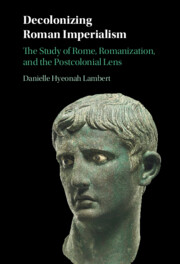Book contents
- Decolonizing Roman Imperialism
- Decolonizing Roman Imperialism
- Copyright page
- Dedication
- Contents
- Acknowledgements
- Introduction
- Chapter 1 The Discourse on Romanization in the Age of Empires
- Chapter 2 Postcolonial Themes
- Chapter 3 Postcolonial Questions in the Age of Decolonization
- Chapter 4 Towards a Paradigm Shift in the Age of Globalization
- Historical Intervention
- References
- Index
Chapter 3 - Postcolonial Questions in the Age of Decolonization
Published online by Cambridge University Press: 03 October 2024
- Decolonizing Roman Imperialism
- Decolonizing Roman Imperialism
- Copyright page
- Dedication
- Contents
- Acknowledgements
- Introduction
- Chapter 1 The Discourse on Romanization in the Age of Empires
- Chapter 2 Postcolonial Themes
- Chapter 3 Postcolonial Questions in the Age of Decolonization
- Chapter 4 Towards a Paradigm Shift in the Age of Globalization
- Historical Intervention
- References
- Index
Summary
The discourse on Romanization took a turn. Influential thoughts from Marxism, the Annales school, and the cliometrics revolution to poststructuralism and postcolonialism travelled and infiltrated Romanization studies. This not only helped to enrich the discourse, but it allowed the posing of meaningful questions. Applying contemporary studies on social structures, economic forces, and cultural politics, historians and archaeologists were able to gradually raise questions concerning the traditional models of parallel discourse, defensive imperialism, and civilizing Romanization. This chapter discusses key works of the Early Adopters, from Dyson, Finley, and Harris to Millett and Woolf to trace the course of postcolonial ideas that travelled to the Romanization discourse. It illustrates how the postwar generation of historians and archaeologists has enriched the Romanization discourse with social, economic, and cultural histories and started to question the imperialist epistemology upon which the discourse on Romanization was built.
Keywords
- Type
- Chapter
- Information
- Decolonizing Roman ImperialismThe Study of Rome, Romanization, and the Postcolonial Lens, pp. 81 - 150Publisher: Cambridge University PressPrint publication year: 2024

